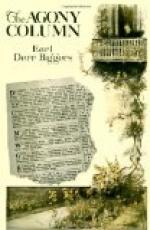“War by midnight, sure!” he proclaimed on the morning of this fateful Tuesday. “I tell you, Marian, we’re lucky to have our tickets on the Saronia. Five thousand dollars wouldn’t buy them from me to-day! I’ll be a happy man when we go aboard that liner day after to-morrow.”
Day after to-morrow! The girl wondered. At any rate, she would have that last letter then—the letter that was to contain whatever defense her young friend could offer to explain his dastardly act. She waited eagerly for that final epistle.
The day dragged on, bringing at its close England’s entrance into the war; and the Carlton bootblack was a prophet not without honor in a certain Texas heart. And on the following morning there arrived a letter which was torn open by eager trembling fingers. The letter spoke:
Dear lady judge: This is by far the hardest to write of all the letters you have had from me. For twenty-four hours I have been planning it. Last night I walked on the Embankment while the hansoms jogged by and the lights of the tramcars danced on Westminster Bridge just as the fireflies used to in the garden back of our house in Kansas. While I walked I planned. To-day, shut up in my rooms, I was also planning. And yet now, when I sit down to write, I am still confused; still at a loss where to begin and what to say, once I have begun.
At the close of my last letter I confessed to you that it was I who murdered Captain Fraser-Freer. That is the truth. Soften the blow as I may, it all comes down to that. The bitter truth!
Not a week ago—last Thursday night at seven—I climbed our dark stairs and plunged a knife into the heart of that defenseless gentleman. If only I could point out to you that he had offended me in some way; if I could prove to you that his death was necessary to me, as it really was to Inspector Bray—then there might be some hope of your ultimate pardon. But, alas! he had been most kind to me—kinder than I have allowed you to guess from my letters. There was no actual need to do away with him. Where shall I look for a defense?
At the moment the only defense I can think of is simply this—the captain knows I killed him!
Even as I write this, I hear his footsteps above me, as I heard them when I sat here composing my first letter to you. He is dressing for dinner. We are to dine together at Romano’s.
And there, my lady, you have finally the answer to the mystery that has—I hope—puzzled you. I killed my friend the captain in my second letter to you, and all the odd developments that followed lived only in my imagination as I sat here beside the green-shaded lamp in my study, plotting how I should write seven letters to you that would, as the novel advertisements say, grip your attention to the very end. Oh, I am guilty—there is no denying that. And, though I do not wish to ape old Adam and imply that I was tempted by a lovely woman, a strict regard for the truth forces me to add that there is also guilt upon your head. How so? Go back to that message you inserted in the Daily Mail: “The grapefruit lady’s great fondness for mystery and romance—”




